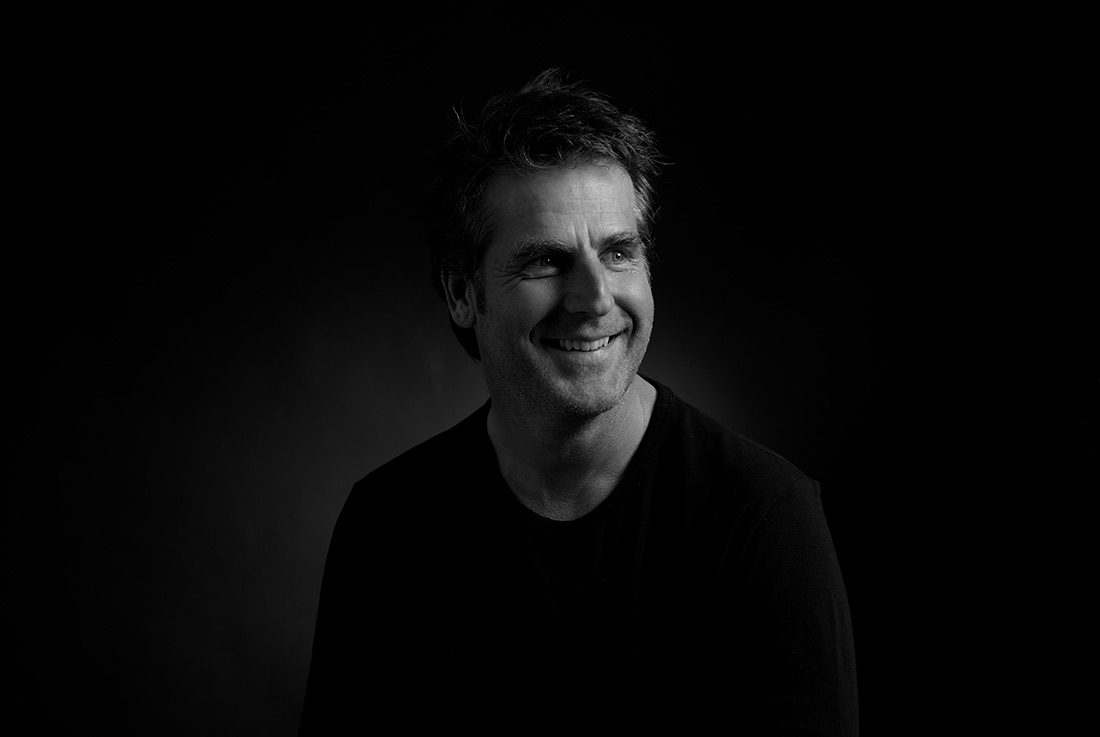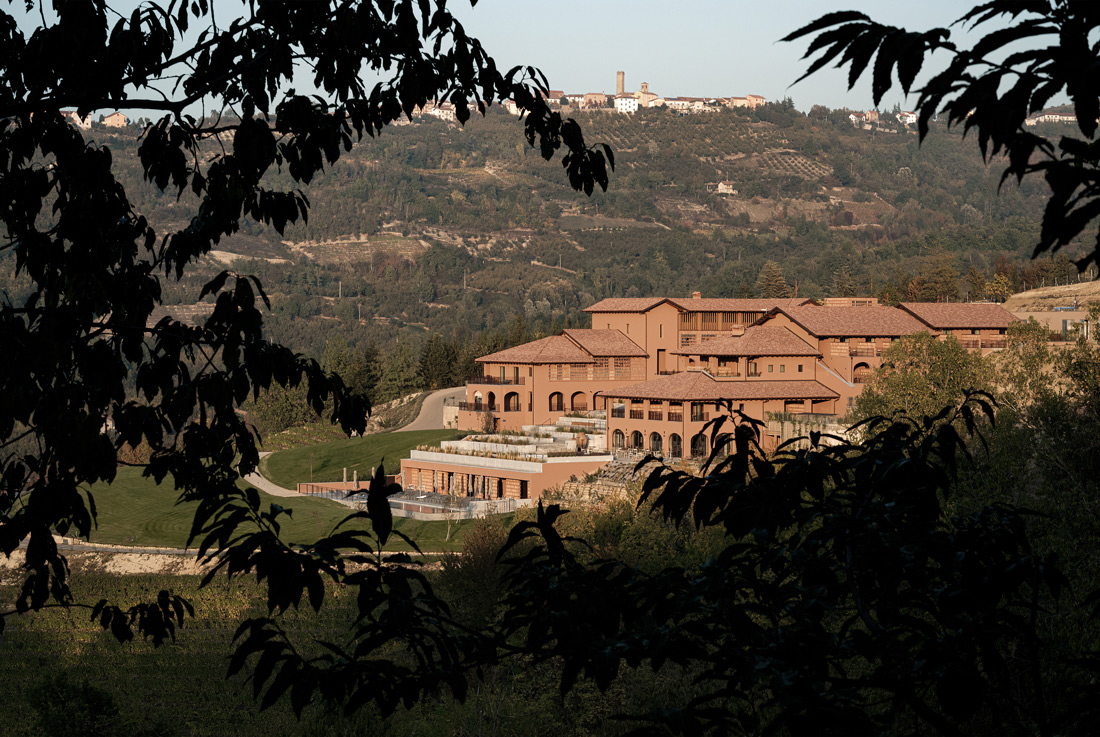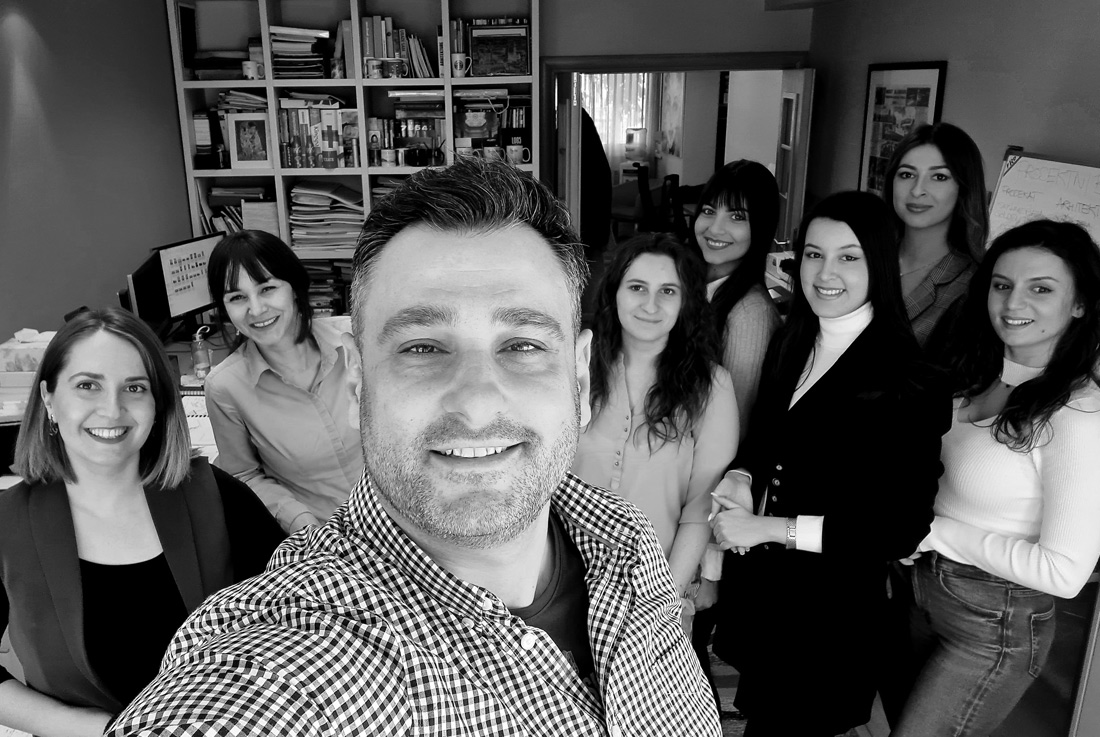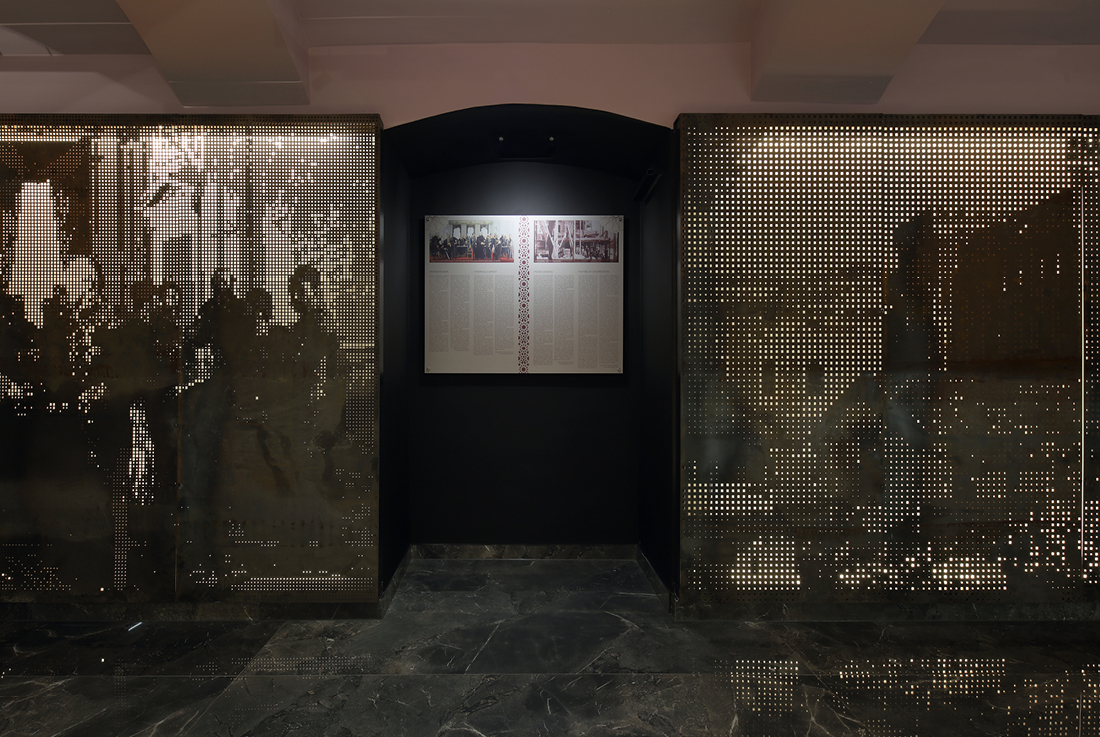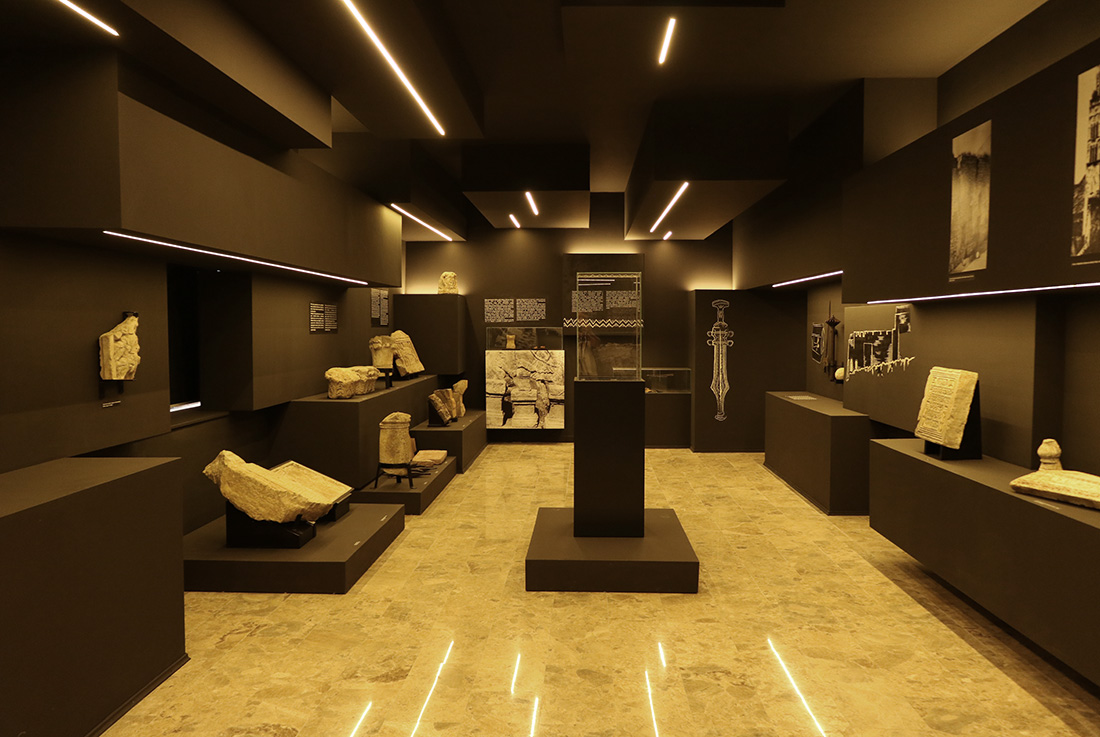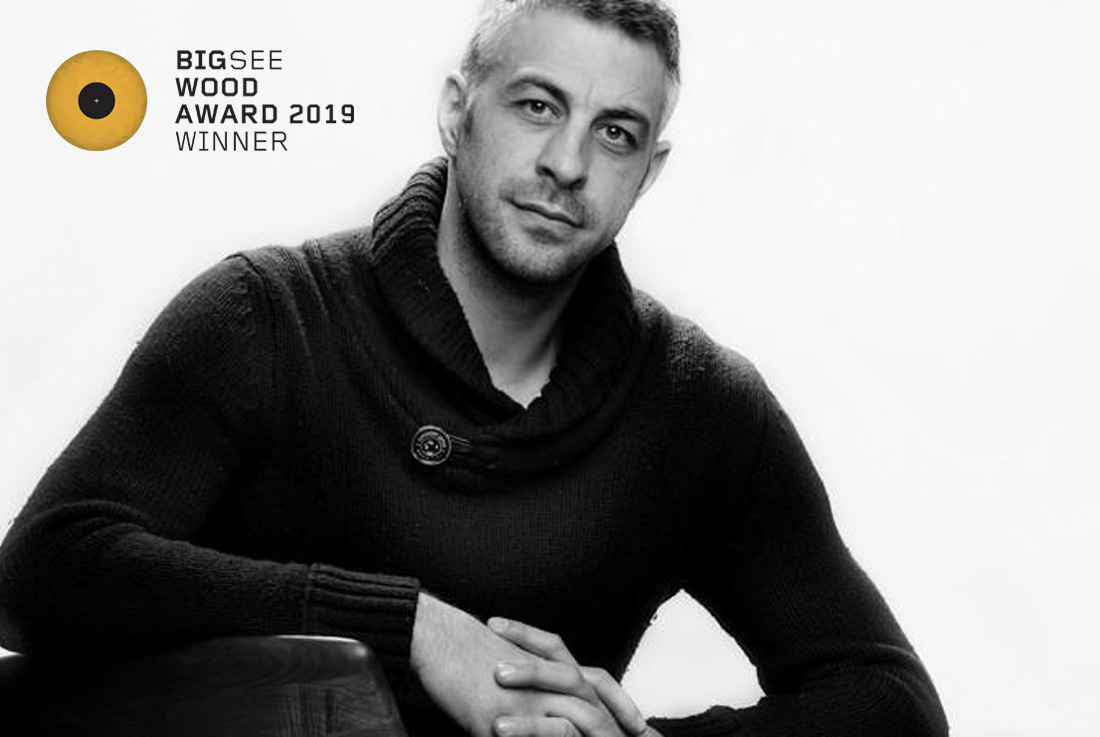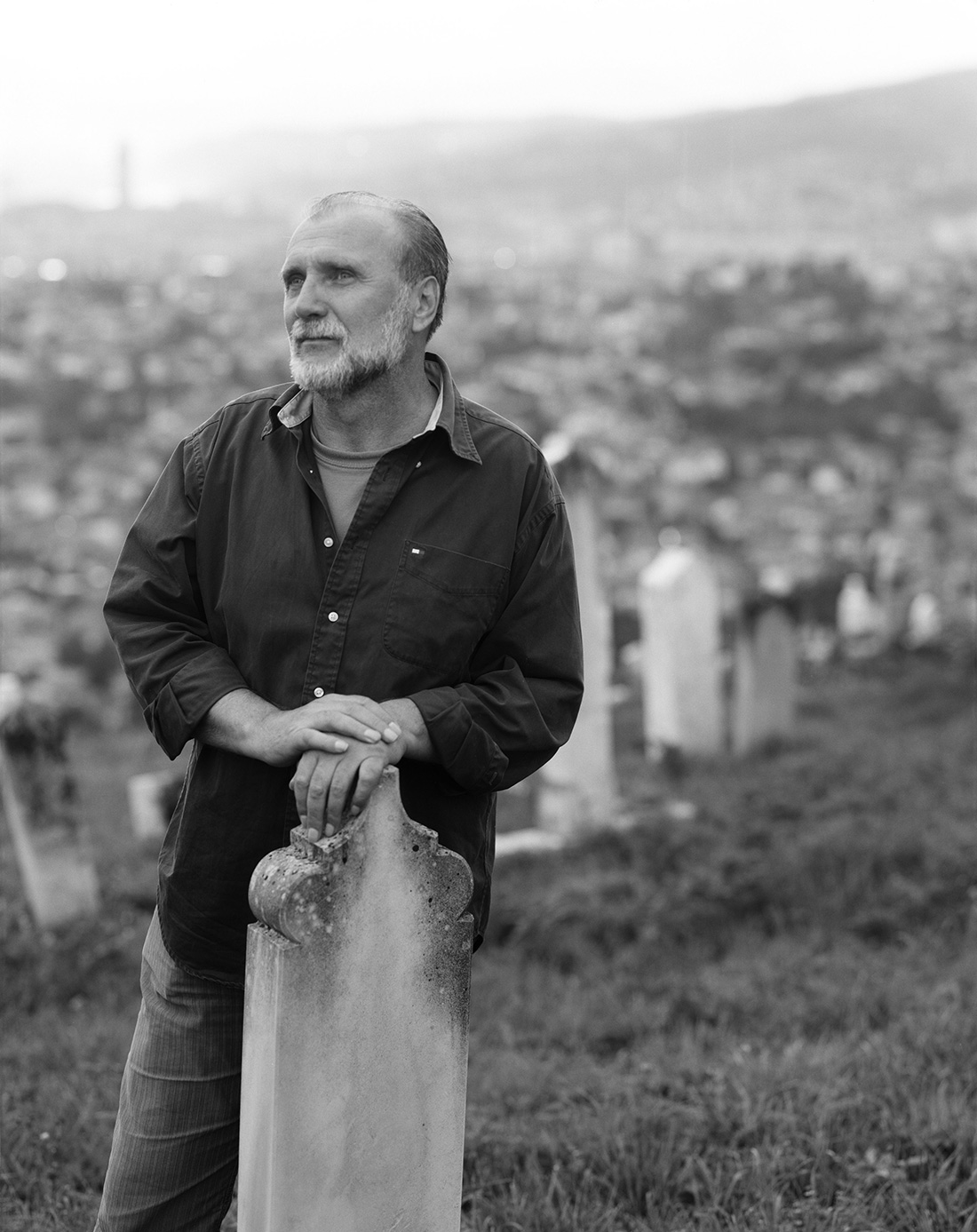
A Socratic shift in thinking is dramatically needed today
Interview with Dževad Karahasan, Bosnian and Herzegovinian dramaturg, writer, professor and academician
Dževad Karahasan is the winner of this year’s Goethe Prize of the City of Frankfurt for his contribution to the mediation between East and West, between Islam and Christianity. He will be awarded the prize on 28 August 2020, the birthday of Johann Wolfgang Goethe.
Link to interview in original language here.
By Jonel Kolić, photo: Tobias Wenzel
Nikolai Gogolj, Russia’s famous dramatist, once noted: “Architecture is a chronicle of the world: It speaks when songs and legends are silent, when no one speaks any longer about a vanished people.” To what extent do you consider the study of architecture important in order to create ambiences belonging to other time periods, like in your novels The Eastern Divan (Istočni diwan) and What the Dust Speaks (Što pepeo priča)?
For students majoring in dramaturgy, I established a “theory of chronotope” which is also discussed in my book entitled „Dis Schatten der Staedte“ (unfortunately, that book hasn’t yet been published in Bosnian language, since I still need to complete some parts of the book). That theory is based on the belief that our perception of time and space is mostly unconscious since within our being it is stored on some very deep levels, even deeper than that which we define as subconscious. You do not really know the reason why in a certain location you always sit in the same place; you might not have even noticed that the seats you choose in a tavern are commonly positioned in a similar way, just like a certain position behind a table that you keep opting for; if you have a visitor, not a very polite one, who does not wait for you to offer him a place to sit, but occupies your most favourite place, you will find his or her visit rather unpleasant, no matter how dear that specific visitor might be to you. You might have noticed that people who want power, commonly place a table on a podium, so that they can watch others from above. Accordingly, it should also be clear to you why King Arthur and his knights congregated behind the famous round table and not behind a table with a “head” which establishes certain hierarchy.
These few examples illustrate nicely how deep the feeling of space lies within us and also depict the importance the role of space plays in our understanding of the world, in our behaviour as well as our attitude towards others and towards ourselves… It is not a coincidence that Isaac Newton viewed space as God’s sensor – we are “managed” by space which is like some kind of metaphysical force. However, we do not notice that and neither can we explain that, not even when we are aware of it. Therefore, the settings, where the characters in my novels live and move, are extremely carefully constructed, and their interpersonal relations in the environments where they meet are very precisely defined and specified. The main protagonists and their behaviour are often characterized by the place they inhabit. The way we design our habitats tells us more about ourselves than we may want it to.
I think that another text of mine, namely The Poetics of Ruins („Poetika ruševine“) from The Book of Gardens („Knjiga vrtova“) nicely illustrates how ambience, building techniques and construction materials are truly important to me. Architecture represents an attempt to create our world, and at the same time, by means of that very attempt, we also show our attitude towards „the big world.“ Violence against the world, as the basis of the so-called modern epoch, was first reflected in architecture, that is in the planning and perceiving of cities: a baroque city (the beginning of modern epoch!) imposes a constructor’s concept upon the world, therefore a constructor does not respect the natural ground on which a city is to be built. Instead, without any hesitation, a hill is eliminated or a river is rerouted if the two call a certain concept into question; a baroque constructor imposes geometric forms upon streets and squares (geometry does not fit into this world), and he forces symmetry, which represents a fundamental design principle, upon everything (however, there is also no symmetry in nature); contrary to the above, „pre-modern cities“ were trying to adjust to the natural ground by developing special building techniques which were specifically tailored to steep-hill constructions (for example in Sarajevo, where the south wall in slope-settlements is commonly two metres higher than the north wall), and by building houses on water.
“Violence against the world, as the basis of the so-called modern epoch, was first reflected in architecture, that is in the planning and perceiving of cities: a baroque city (the beginning of modern epoch!) imposes a constructor’s concept upon the world, therefore a constructor does not respect the natural ground on which a city is to be built. Instead, without any hesitation, a hill is eliminated or a river is rerouted if the two call a certain concept into question; a baroque constructor imposes geometric forms upon streets and squares (geometry does not fit into this world)”
In your early essay collection, On Language and Fear (O jeziku i strahu), you talk about a fear of difference which is, through language and consequently through the entire human spiritual production, manifested as a process of erasing differences. This happens when one cultural segment starts dominating over other cultural segments (just like religion in the Middle Ages, or science in the period of scientific optimism, and ideology in the 20th century). Would you agree with the statement that space, analogous to language, reflects both harmony and chaos of the cultural sphere?
Yes, certainly. If space represents „God’s sensor“, then language represents a barrier between this world and that world, between the material and the spiritual, since it is in language itself where the material and the spiritual can meet and become inseparable. Therefore, language represents the basis where we can build our perception of the transcendental. It is in language and space (comprehension and creation of an ambience) where the zeitgeist (the spirit or mood of a particular period of history) is most obviously revealed, manifested and expressed. If you are interested in a certain zeitgeist, you should analyze people’s speaking habits in that particular period of time. In one of the essays in my book On Language and Fear, I examined the fact that in the language of Yugoslavian society in that time, all the verbs were reduced to one single (impersonal) verb, to perform. On my barber’s mirror it was written: „The washing of your hair is performed here“. One company „performed the buying of gold“. State institutions „performed analysis of business operations”… There was no one who would wash our hair, analyze, buy – everything was „performed“. On those grounds, I made a conclusion that our society could not be reformed – if words denoting movement, work, action had disappeared from the language, it was clear that it would have been impossible to achieve changes in such society – that society was transformed to a horrible vision of Zenon Elea, to the world where Achilles would never be able to catch up with the tortoise and where one could not be killed by an arrow since movements were not possible in that world. It would take too much space and time if we wanted to have fun with an overflow of superlatives existing in the language of our contemporaries. However, I would like to direct your attention to this habit and I suggest we give it a thought.
All that is also true for space. The horrible “logics of industrial standards” is most clearly revealed in a modern city. My friend has tried to open doors of other people’s flats around five to six times – he has an apartment in a newly built settlement and God knows how many times he has entered a building which is not his. How can one distinguish between two different examples of the same car make? Ok, by colour. But, how to make a distinction if they are the same colour? How to distinguish between two identical equilateral triangles?
Goethe once said that good buildings are like “frozen music”. I think it is absolutely true and I am sure that music and architecture indeed converge somehow. They do not take away our spirit to some other spheres and they do not reveal to us what picture of the world we have. However, through music and architecture, that is the forming of space, we detect powers coming from some other spheres which control our bodies and, consequently, have impact on our spirit. You have noticed that you commonly react to music and you always do it with your body – you follow a rhythm by clapping your hands and by moving your legs as if you wanted to dance, by snapping your fingers, or by conducting … Your body reacts to music, whether you want it or not. You get to know and remember a certain place by means of your body. You do not need light in order to find your way around your apartment, and you do not have to think where you are going in order to reach a place you usually visit. Your body itself automatically avoids the corner of a table where you have hit yourself twice…
“It is in language and space (comprehension and creation of an ambience) where the zeitgeist (the spirit or mood of a particular period of history) is most obviously revealed, manifested and expressed. If you are interested in a certain zeitgeist, you should analyze people’s speaking habits in that particular period of time.”
In the previously mentioned book, On Language and Fear, your reflections are based on the presumption that there are two existing worlds – the language world and the non-language (material) world. In Bosnian language there is an etymological connection between the words world (svijet) and light (svijetlo). Bearing in mind Wittgenstein’s statement: “The limits of my language mean the limits of my world,“ we could say that language sheds light (svijetlo) upon the world (svijet). Do you think it is possible to conceive reality that exists outside the realm of language, i.e. outside the realm of the signifier?
We have always been trying to sense the things surrounding language, namely, the worlds language has never named or precisely specified, but it has somehow indicated or implied them. We were given a kind of an insight into those worlds by means of rituals which frequently combined symbolic acts, narcotics (in natural form, which cannot be compared to today’s narcotics) and ecstatic dances. There are a few nice examples of this such as: Dionysus and Eleusinian cults, ceremonies “showing” the travels of the Egyptian God of Sun through the lower world, and, in some way, also the rituals of some dervish orders where a participant reaches a mystical experience by means of a dance (Mevlevi dervish order) or specific breathing techniques (Naksibendi order) … In any case, when knowledge about these worlds is inseparably linked to ecstasy, therefore with an exit from oneself – you cannot become familiar with something that exists outside language as long as you are anchored in your own human being. What you have learnt during the period of ecstasy cannot be transferred or expressed by giving it a name, it can only be expressed by means of a narrative – you can narrate it, experience it, live it.
The Finnish architect Juhani Pallasma – who makes architects aware of the importance of phenomenological and sensory perceptions of space, mostly through his books (The eyes of the skin, Thinking hand…) and lectures – was once asked by his students, what his advice to a young architect would be. Pallasma replied: “You should read literature.“ He further explained that through literature it is possible to absorb the atmospheres which are necessary for designing expressive spaces. Is the atmosphere which a certain work of literature radiates something that a writer himself conducts or does the atmosphere appear, irrespective of an author’s wish, the moment a certain literary work becomes “separated“ from an author?
Thank you for notifying me about this. I did not know that, but I like it a lot. Literature and architecture nicely supplement each other. The first noteworthy architect, Imhotep, who built Djoser Step Pyramid, was also a great writer. The great Soviet cultural philosopher Mihail Bahtin claimed that behind a “textual body” of a story or dramatic literature one can sense or see the architecture of the presented world. I personally like talking about the architecture (construction) of my novels. I have always wanted to invite an architect to give a lecture to my dramaturgy students. I had an agreement with a renowned architect Zlatko Ugljen who was willing to lecture at the Sarajevo Academy of Dramatic Arts, but, unfortunately, due to the war in 1992, our plans failed. I am absolutely certain that it would have been a truly precious experience for my students, since a playwright should be able to think in terms of space.
Nevertheless, to answer your question, being a Goethe “disciple”, I strongly believe that a work of art contains something of the organic world. The main difference between the mechanical and the organic lies in the fact that a mechanical phenomenon is a pure construction, an object, a product of a certain plan, whereas an organic phenomenon is, to some extent, a being that exists on its own. When you grow an apple tree, it grows on its own. You water it and prune it, however, the final result will never be based only on your own work. Therefore, the term “autopoiesis” occupies an important place in my poetics – self-creation, self-fulfillment. In a particular moment, a certain work, at least to some extent, starts creating itself, that is, it determines its own form – characters start acting independently, the subject matter or the theme begins to develop in accordance with its own, not in accordance with my logics any more. The “atmosphere” of a novel or a play is one of those things that cannot be constructed, planned or made. A literary work either has or does not have an atmosphere which functions as an “organic phenomenon” or as an “independent being”. Just like people who either have or do not have charm, persuasiveness and similar – the new sophists may indeed try to convince us that this shall be rendered possible, but we know that it cannot be reached, since those attributes do not represent skills that can be learnt, but they exemplify inborn features of an organic being.
“A literary work either has or does not have an atmosphere which functions as an “organic phenomenon” or as an “independent being”. Just like people who either have or do not have charm, persuasiveness and similar – the new sophists may indeed try to convince us that this shall be rendered possible, but we know that it cannot be reached, since those attributes do not represent skills that can be learnt, but they exemplify inborn features of an organic being.”
„Time was the very first architecture people created in order to live.” These are the words by the Italian philosopher Umberto Galiberti who thus repeats that specific intimate connection between time and space, the connection which had already been defined by means of two similar expressions, namely „tempus” and „templum”, used by the German scholar Hermann Usener, wherein the first term designates time, and the second term stands for a (sacred) space. Today’s global digitalization reduces our lives to spaceless and momentary (timeless) experiences. You personally insist that humans are beings of time – defined by Plato as the moving image of eternity – as well as beings of space, therefore I would appreciate it if you could explain in what way can human beings become again rooted in changeability, in the sensory, in the analogue, without losing the sphere of eternity?
The digital world has invented a new way of selling us an illusion which had once already been sold to us by the great philosopher and mathematician Renatus Cartesius (Rene Descartes). In his “Discourse on Method” he stresses the importance of knowledge which is independent from everything that is accidental, and the significance of thinking which is free from all the influences, even the influences of space and time. Cartesius highlights the importance of thinking which results in absolute and reliable knowledge, therefore he suggests mathematics as a role model, as a perfect ideal, which has to be achieved if we want to be able to think clearly. However, he forgot that in the world of mathematics there is no body, no emotions, no life. Things existing outside time and space are not and cannot be alive. Nevertheless, that is precisely what Cartesius offers us as a perfect ideal. If we joke around a bit, in the world of arithmetic “two times two” always makes four since in that world there is no, and there can be no body, life, personality, form, emotion … If just a tiny bit of life enters the world of arithmetic, “two times two” will sometimes make four, rarely five, mostly three, in the moments of genuine enthusiasm (for instance, when we learn that she truly loves us) seven.
That notion established by Descartes was taken over by some exact sciences which proclaimed it as the only relevant type of thinking. This is precisely why exact sciences did not provide a reply to one single profoundly human question. And this is precisely why digitalization represents a legitimate child of the scientific type of thinking. That type of thinking reduces knowledge to information, which is absolutely wrong. You can read thousands of manuals on swimming, you can have all possible information about swimming at your disposal (which muscle is activated during swimming, when a certain joint is burdened, how many calories are burnt in a certain period of time), however, without ever touching water with your body, you will know nothing about swimming. Information represents the final result of an analytical method which keeps reducing the subject of cognition to elementary particles which cannot be further divided, and which, of course, never suits the real object. Chemistry, as an exact science, has used an analytical method to extract tannin, alcohol and water from wine – and chemistry wants me to believe that it truly is wine. In the trinity “tannin, alcohol and water” there is no flavour, there is no sun which warmed the grapes, there is no soil and no hand which cut the leaves of a vine so that the grapes could be exposed to the Sun, there is no aroma betraying the region of the wine’s origin. Seriously, who will become excited about the trinity “tannin, alcohol and water”? And who will not become excited about wine, unless they are allergic to alcohol? Just like Descartes theories, digitalization is depriving us of experience and is taking away the body, concreteness, emotion, life – it is separating us from time and space, thus indeed killing us.
I think that here somewhere lies the answer to your question: a Socratic shift in thinking is desperately needed today. Do you remember? After the precious cosmological teachings (by Tales and Heraclitus, Pythagorean and Aeolian school), it is Socrates who comes to the podium and reminds us that we are, in fact, humans. We may come up with questions which are no longer questions by humans, but our answers will always be only and merely answers provided by humans. Such a turn or change is desperately needed today, like the air we breathe or water we drink. We need a certain Socrates to explain to us that our answers will always be answers given by humans and that they will remain human answers, regardless of the number of machines and digital miracles which we have squeezed between questions and answers. If we do not want the tech-preachers to transform us into machines, we need to restore inductive thinking, an ability to think with our bodies, the forms of cognition which are brought about by rituals, art, we have to renew our emotional intelligence. Safety and eternity, which are offered to us by Cartesius and digitalization, represent a pointless eternity of inorganic matter, however, we have to fight for our life.
“I think that here somewhere lies the answer to your question: a Socratic shift in thinking is desperately needed today. Do you remember? After the precious cosmological teachings (by Tales and Heraclitus, Pythagorean and Aeolian school), it is Socrates who comes to the podium and reminds us that we are, in fact, humans. We may come up with questions which are no longer questions by humans, but our answers will always be only and merely answers provided by humans. Such a turn or change is desperately needed today, like the air we breathe or water we drink. We need a certain Socrates to explain to us that our answers will always be answers given by humans and that they will remain human answers, regardless of the number of machines and digital miracles which we have squeezed between questions and answers.”
You frequently underline the importance and uniqueness of human beings and the fact that human beings are destined to be original. What, in your view, has led mankind to initiate this uncontrollable industrial production which has, in architecture as well as in design (let us remember the impersonal furniture described in your novel Šahrijar’s Ring), damaged people’s habitat on the level of macro and micro space? Does, maybe, the cause of the problem lie in techne which has, from the originally Greek concept which sees techne as a means of achieving an objective, transformed itself into that very objective?
Here we are dealing with the type of thinking which has been forced upon us as the only correct way of thinking. Analytical thinking, which was defined by Descartes, is truly precious when dealing with mathematics, technics, inorganic matter … That type of thinking only detects elements which are typical for the phenomena it is concerned with, and thus it keeps recognising the elementary, the unchangeable, the substantial. Such thinking, however, tries not to see or take into account the special, the atypical, the individual. It has already been mentioned that exact sciences cannot provide answers to one single profoundly humane question, and this is probably due to the fact that people have their own personalities, they are unique individuals, and each of them represents an exception. The great Franciscan thinker Duns Scotus claims in his discussion on the principle of individualization that a human being, as a work of creation, becomes complete when he is exposed as an individuum who is unique and only conditionally comparable to other people. Dear God does not generate serial production, he creates only unique beings. It is great that we have Descartes, so that we can keep learning about unchangeable things, about the elements which exist outside the dimensions of time and space, about that which is not moving (nowadays we can say that this type of thinking is precious if we want to become familiar with structures); however, we have to bear in mind that we should also learn about the things which are changeable, unique, one-of-a-kind, about that which is moving (nowadays we can call it a process). An industrial standard is a legitimate child of analytical, technical thinking, and it proves to be valuable for the production of car parts. Nevertheless, it is pretty useless when it comes to perceiving and understanding people, and what has happened to us is just that – we have introduced the logics of industrial standards into humanity disciplines. Have a look into the new methods of studying and researching literature and see how hard they are trying to be on the same level with the exact sciences! Today’s literary science can explain what Chekhov plays, the ancient Egyptian fable “Two Brothers,” and a certain graduation exam have in common, but it cannot help you to recognize and articulate the difference between them. And culture is, just like life itself, an exciting game which represents the tension between similarities and differences, between the common and the particular, the general and the individual. Therefore, we have to remember that technical thinking represents only one side of that piece of paper where our existence is being written.
“And culture is, just like life itself, an exciting game which represents the tension between similarities and differences, between the common and the particular, the general and the individual. Therefore, we have to remember that technical thinking represents only one side of that piece of paper where our existence is being written.”
In your essay To Emigrate into Life you use Heinrich Heine as an example in order to illustrate the idea that one can perceive one’s place of birth objectively only in the moment of emigration. Did a view from a distance help you understand Sarajevo more profoundly, and has it also formed you as a writer whose poetics is based on the cultural paradigms of the East and the West?
To Emigrate into Life represents a subtle polemic with the current “hysteria of safety”. Politicians win elections if they promise more policemen, more safety, more spying. We are witnessing increasingly intense humiliation at airports “on account of our safety”. People, who are becoming more and more scared, accept that their telephone conversations are being recorded, that their payments are registered, and that information about their meetings is stored – they accept everything if they are given the explanation that such measures will contribute to their safety. We often forget that the greatest safety in this world is provided in special prison departments. And we are given even more safety in the grave, but that is no longer this world. I just wanted to remind us all that our life itself represents the one and only eternal uncertainty, and I wanted to stress that we are all emigrants in this life. You shall not forget that religions begin with exoduses, departures, emigrations; you shall not forget that our birth itself represents a kind of emigration. Religious people know that we have all been banished from paradise, and those who do not believe in paradise know that we have been banished from the womb – in any case we are just emigrants. And uncertainty is the twin sister of an emigrant.
Thank you for your remark that my work “To Emigrate into Life” is related to my experience with Sarajevo. That’s true, it is related to it, but I was not aware of that up to the point of this interview. Sarajevo is a city which enables you (actually it forces you) to become familiar with yourself from the inside as well as from the outside, and it has an ambience which does not allow you to be in a comfortable accordance with yourself. That is why, in my judgment, Sarajevo represents a city where real objectiveness can be encountered, objectiveness which is based on the union of views from the inside and from the outside. Today we are taught that only views from the outside represent an objective view, but that really is not true, since views from the outside only represent an external perception. An objective view is one that unites both, external and internal perspectives, that is your perception of me as well as a perception of a complete stranger, and my own perception of myself.
“I just wanted to remind us all that our life itself represents the one and only eternal uncertainty, and I wanted to stress that we are all emigrants in this life. You shall not forget that religions begin with exoduses, departures, emigrations; you shall not forget that our birth itself represents a kind of emigration. Religious people know that we have all been banished from paradise, and those who do not believe in paradise know that we have been banished from the womb – in any case we are just emigrants. And uncertainty is the twin sister of an emigrant.”
Dževad Karahasan (born in 1953 in Duvno, today Tomislavgrad) is a Bosnian and Herzegovinian dramaturg, writer, professor and academician. He studied comparative literature and theatre studies at the Faculty of Arts in Sarajevo, a city later to be one of his strongholds and an important topic pervading his literature and essays. He completed his PhD studies in Zagreb. He was the arts and culture editor of the Sarajevo magazine Odjek, and he was the editor-in-chief of the magazine for art theory and criticism Izraz. Between 1986 and 1993, he was the dean of the Academy of Performing Arts at the University of Sarajevo. Since 1994, he has been a guest lecturer at various universities, including Salzburg, Innsbruck, Basel, Berlin, Sarajevo, and Graz where he was given a prestigious status of a city chronicler. His books have been translated into twenty languages. He has published various novels: The Eastern Divan, Shahrijar’s ring, Sara and Serafina, The Night Council, What the Dust Speaks; short stories: King’s Legends, A House of the Wearied, Reports from the Dark Country; essays: On Language and Fear, The Book of Gardens, Diary of an Exodus. He has been granted numerous international literary awards, among others the Goethe Medal 2012 and the Goethe Prize 2020.


